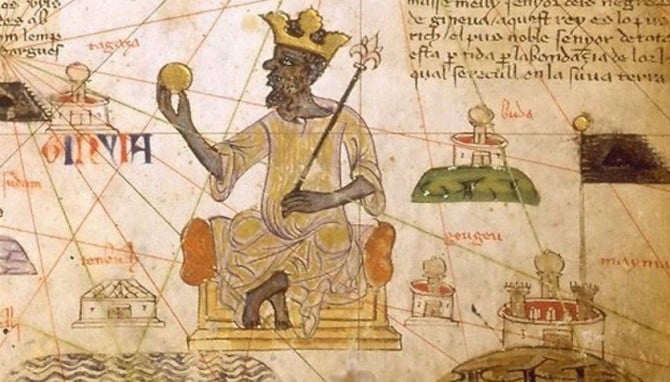Mansa Musa at a Glance
- Categories: Politicians, Politicians > Royals
- Net Worth: $400 Billion
- Birthplace: Mali Empire
- Gender: Male
Mansa Musa: The Richest Man in History and His Unfathomable Wealth
Introduction: Unveiling Mansa Musa
Mansa Musa, the tenth Mansa (Emperor) of the Mali Empire, reigned from 1312 to 1337. He is celebrated as one of the wealthiest individuals in human history, a title largely attributed to the vast gold reserves within the Mali Empire during his rule. His name echoes through history, not just as a ruler, but as a symbol of immense wealth, power, and cultural influence. This article delves into the life, reign, and legacy of Mansa Musa, exploring the sources of his incredible wealth and his impact on the world.
The Reign of Mansa Musa: King of Kings
Born in 1280, Mansa Musa ascended to the throne of the Mali Empire, inheriting a domain that had once been part of the Ghana Empire. The title “Mansa,” meaning “King of Kings” or Emperor, reflected his supreme authority. His reign marked a period of significant territorial expansion, economic prosperity, and cultural flourishing within the Mali Empire. Mansa Musa was not only a powerful ruler but also a devout Muslim who implemented significant building projects and promoted Islamic scholarship.
Mansa Musa held several significant titles, including Lord of the Mines of Wangara, Emir of Melle, and Conqueror or Ghanata, showcasing his dominion over crucial regions and resources. His rise to power was facilitated by his appointment as a deputy to Abubakari II, who embarked on an expedition from which he never returned. This event paved the way for Mansa Musa to become the ruler and lead the flourishing Mali Empire. His legacy is tied to the expansion of the empire’s influence and infrastructure.
Mansa Musa’s Net Worth: A Fortune Beyond Measure
At the height of the Mali Empire’s prosperity, Mansa Musa’s net worth was estimated to be equivalent to $400 billion in modern U.S. dollars, as referenced by Celebrity Net Worth. This astronomical figure underscores the empire’s immense wealth, largely derived from its extensive gold production. Mansa Musa controlled a significant portion of the world’s gold supply, which played a key role in his economic dominance. The exact amount of gold controlled remains a topic of historical speculation, but it is undeniable that his financial power was unparalleled.
To put his wealth into perspective, consider his net worth against some of the wealthiest individuals in modern history, such as Elon Musk, John D. Rockefeller, and Andrew Carnegie. Mansa Musa’s wealth exceeded all of these individuals, highlighting the extraordinary scale of his fortune.
The Pilgrimage to Mecca: A Display of Unprecedented Generosity
Perhaps the most well-known aspect of Mansa Musa’s reign is his celebrated pilgrimage to Mecca in 1324. This journey, spanning 2,700 miles, was accompanied by a lavish procession of 60,000 men and 12,000 slaves. Every single person carried luxurious items, including silk and gold bars. The procession was a dazzling display of wealth and power that left a lasting impression on all who witnessed it.
During his pilgrimage, Mansa Musa’s generosity was extraordinary. He distributed vast amounts of gold to the poor and traded extensively, inadvertently causing a significant devaluation of gold in cities like Cairo and Medina. This act of generosity, although well-intended, had economic consequences that required him to borrow gold at high interest rates to stabilize the market. This event underscores his profound economic influence during that time.
- The procession included 60,000 men and 12,000 slaves.
- Each slave carried four pounds of gold bars.
- The journey was approximately 2,700 miles.

Mansa Musa
Legacy of Wealth and Influence: Mansa Musa’s Lasting Impact
Mansa Musa’s reign is often regarded as the golden age of the Mali Empire, thanks to the vast construction programs he sponsored and the empire’s enhanced global reputation. He commissioned the building of mosques and madrasas, most notably the Sankore Madrasah in Timbuktu, which became a center of learning and Islamic scholarship. His encouragement of urban living and investment in education helped develop major cities. During his time, the University of Sankore grew one of the largest libraries in the world, further enhancing the city’s prominence.
His expansion of the Mali Empire, including the acquisition of Timbuktu and Gao, established them as vital centers of trade and culture. The construction of Djinguereber Mosque by architects from Spain and Egypt is a testament to his influence. The rise of Timbuktu as a center of learning and trade attracted merchants from across the world, including southern European cities such as Venice and Genoa. This enhanced exposure led to a significant increase in trade and cultural exchange.
Mansa Musa in Pop Culture
Mansa Musa’s influence extends far beyond history books and has permeated into modern popular culture. He has been featured in numerous video games, including “Civilization IV” and its expansion “Civilization IV: Gathering Storm,” as the leader of the Malian faction. He was also a subject of an “Epic Rap Battles of History” episode titled “Jeff Bezos vs. Mansa Musa,” which underscores his enduring legacy as a symbol of immense wealth. Furthermore, the American rapper Anderson .Paak’s album “Oxnard” features a track called “Mansa Musa,” which is a testament to his impact.
/**/
Conclusion
Mansa Musa’s legacy as the richest man in history remains a captivating subject. His reign was marked by incredible wealth, influential displays of generosity, ambitious architectural and infrastructure projects, and expansion of the Mali Empire. From his iconic pilgrimage to Mecca to his promotion of education and trade, Mansa Musa’s impact is still felt today. His story serves as a reminder of the power of wealth, the significance of cultural exchange, and the enduring allure of historical figures who shaped the world. His story, though, is a lesson in history that continues to captivate and inspire.

